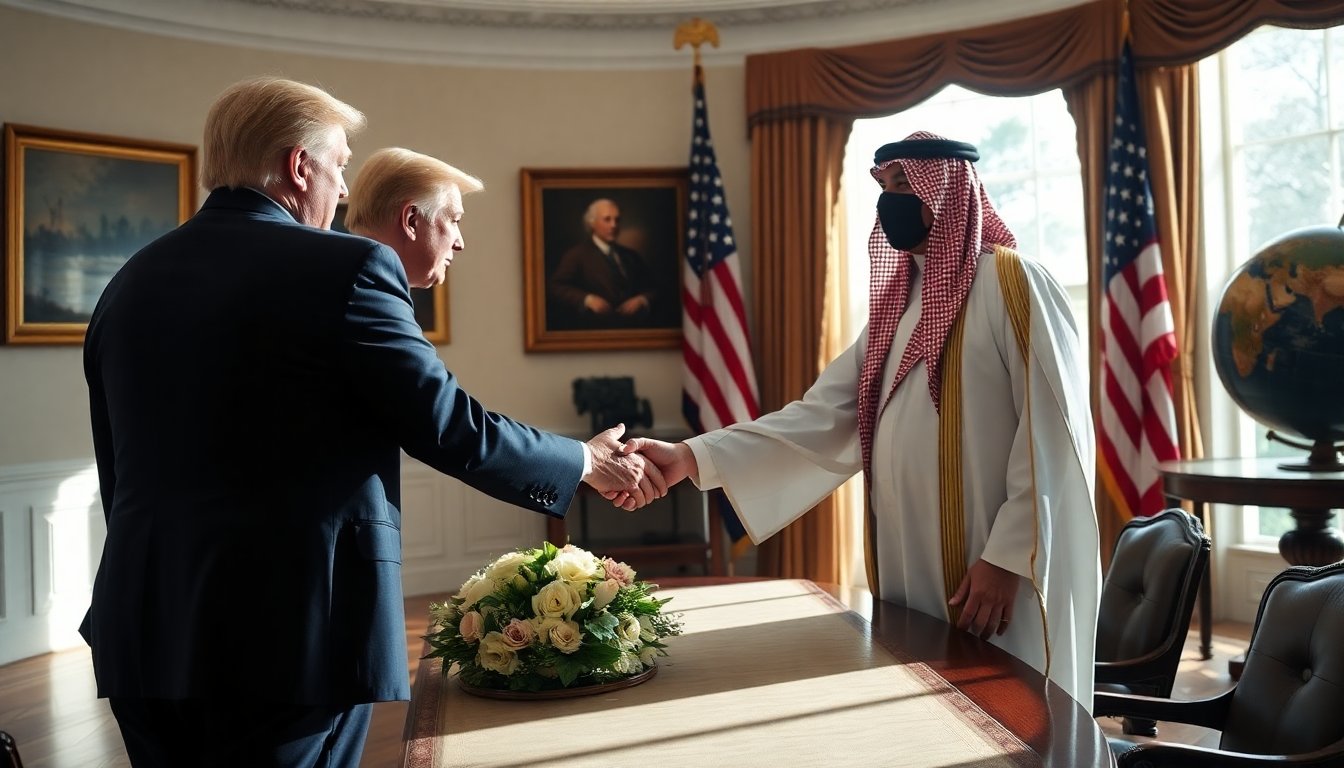Table of Contents
In a surprising turn of events, President Donald Trump welcomed Saudi Arabia’s Crown Prince Mohammed bin Salman to the White House, marking a significant moment in U.S.-Saudi relations that had been strained following the 2018 assassination of journalist Jamal Khashoggi. The visit comes seven years after the controversial killing, which had cast a long shadow over the diplomatic ties between the two nations. Trump’s warm reception of the crown prince has reignited discussions about the ethical implications of U.S. foreign policy, especially regarding human rights.
Revitalizing Relations with Saudi Arabia
Upon his arrival, the crown prince was greeted with an elaborate ceremony, including military honors, signifying the importance of this visit. Trump, in a moment that drew criticism, dismissed the serious concerns surrounding Khashoggi’s murder, suggesting that the crown prince had no involvement. During a press conference, he stated, “Things happen,” while referring to Khashoggi’s controversial status, which he claimed tainted public perception of the journalist.
Trump’s Controversial Defense
In stark contrast to U.S. intelligence reports that indicated the crown prince’s likely approval of the assassination, Trump’s defense of Mohammed bin Salman was robust. He characterized the crown prince as an essential player in shaping the future of the Middle East, asserting that the kingdom had taken the necessary steps to address Khashoggi’s death. The crown prince echoed this sentiment, claiming that his nation conducted a thorough investigation and labeled the incident a “huge mistake.”
Economic Ties and Future Investments
As part of their discussions, the crown prince announced a significant increase in Saudi investments in the United States, raising the commitment from $600 billion to an impressive $1 trillion. This development not only indicates a strengthening of economic ties but also reflects Trump’s ongoing interest in fostering a business-friendly relationship with the kingdom. During the meeting, the crown prince praised the U.S. as the “hottest country on the planet” for foreign investment, aligning with Trump’s vision of promoting economic growth through international collaboration.
Potential Military Sales and Geopolitical Implications
During the visit, discussions also centered around the potential sale of advanced military technology, specifically the F-35 fighter jets. This proposal has raised eyebrows, particularly among Israeli officials, who are concerned about maintaining their military advantage in the region. Trump reassured that the model available to Saudi Arabia would be comparable to the one in use by Israel, attempting to balance the geopolitical landscape while courting Saudi cooperation.
Human Rights Concerns Resurface
Despite the diplomatic overtures, the shadow of Khashoggi’s assassination looms large over this renewed relationship. Human rights organizations have condemned Trump’s remarks, arguing that his defense of the crown prince makes him complicit in the ongoing repression of dissent in Saudi Arabia. Activists have pointed out that the Saudi government continues to imprison journalists and human rights advocates, a situation that contradicts the values often espoused by the U.S. administration.
As the crown prince’s visit unfolded, Khashoggi’s widow publicly called for accountability, urging the Saudi leader to apologize for her husband’s death, highlighting the ongoing struggle for justice in this case. Trump’s administration, while keen on fostering business and military ties, faces the challenge of reconciling these interests with the pressing need for human rights advocacy.
The meeting concluded with a gala dinner, underscoring the personal rapport between Trump and the Saudi leader. As the two nations prepare for an investment summit, the complexities of U.S.-Saudi relations remain evident, as both sides navigate the delicate balance of diplomacy, economic interests, and human rights.


